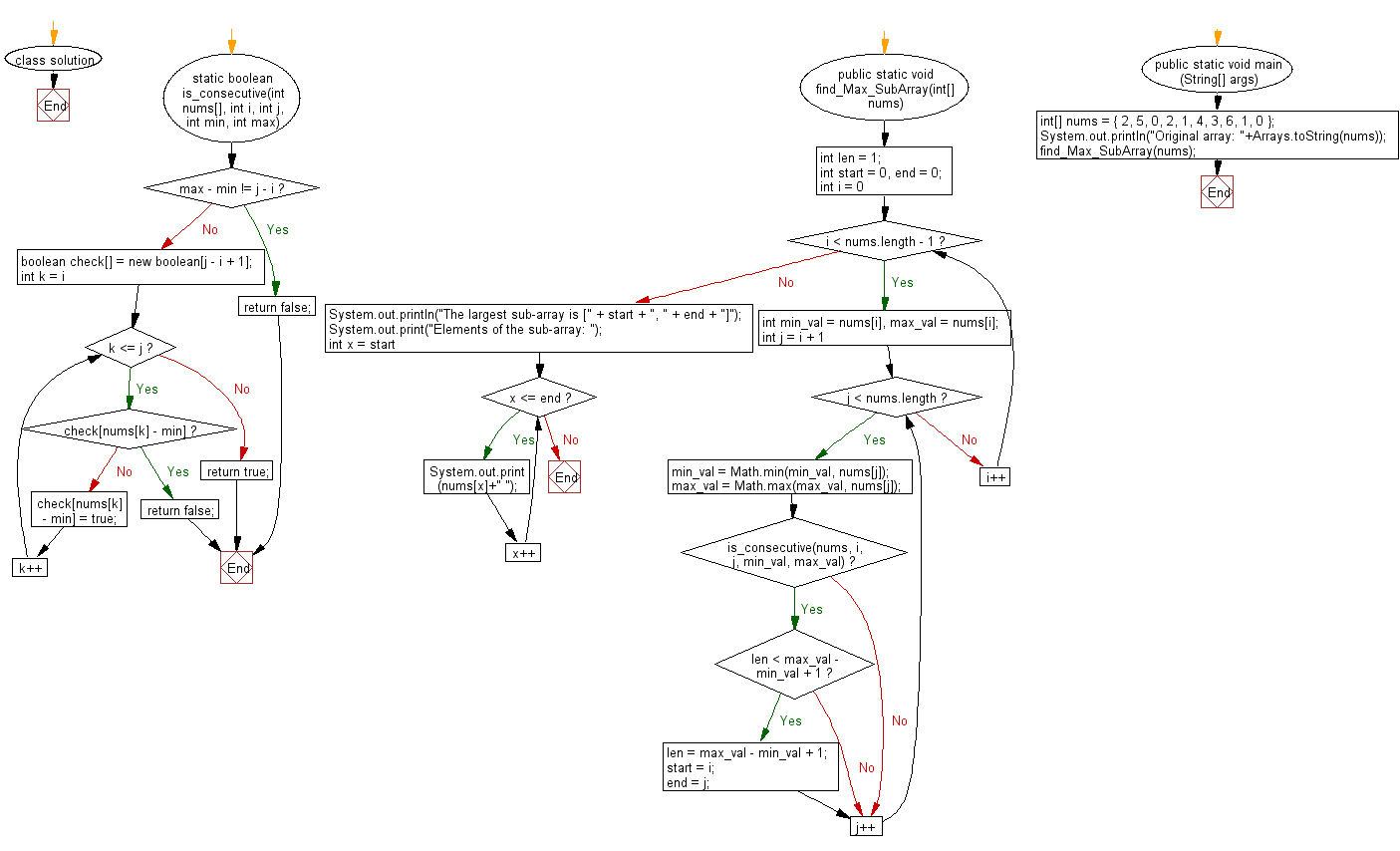Java: Check if a sub-array is formed by consecutive integers from a given array of integers
57. Check if sub-array is formed by consecutive integers
Write a Java program to check if a sub-array is formed by consecutive integers from a given array of integers.
Example:
Input :
nums = { 2, 5, 0, 2, 1, 4, 3, 6, 1, 0 }
Output:
The largest sub-array is [1, 7]
Elements of the sub-array: 5 0 2 1 4 3 6
Sample Solution:
Java Code:
// Import necessary Java classes.
import java.lang.Math;
import java.util.Arrays;
// Define a class named 'solution'.
class solution
{
// A method to check if the elements in a sub-array are consecutive.
static boolean is_consecutive(int nums[], int i, int j, int min, int max)
{
if (max - min != j - i) {
return false;
}
// Create a boolean array to check for duplicates.
boolean check[] = new boolean[j - i + 1];
// Check each element in the sub-array.
for (int k = i; k <= j; k++)
{
if (check[nums[k] - min]) {
return false;
}
check[nums[k] - min] = true;
}
return true;
}
// A method to find and print the largest consecutive sub-array.
public static void find_Max_SubArray(int[] nums)
{
int len = 1;
int start = 0, end = 0;
for (int i = 0; i < nums.length - 1; i++)
{
int min_val = nums[i], max_val = nums[i];
for (int j = i + 1; j < nums.length; j++)
{
min_val = Math.min(min_val, nums[j]);
max_val = Math.max(max_val, nums[j]);
// Check if the sub-array is consecutive and larger.
if (is_consecutive(nums, i, j, min_val, max_val))
{
if (len < max_val - min_val + 1)
{
len = max_val - min_val + 1;
start = i;
end = j;
}
}
}
}
// Print the largest sub-array and its elements.
System.out.println("The largest sub-array is [" + start + ", " + end + "]");
System.out.print("Elements of the sub-array: ");
for (int x = start; x <= end; x++)
{
System.out.print(nums[x] + " ");
}
}
public static void main(String[] args)
{
int[] nums = { 2, 5, 0, 2, 1, 4, 3, 6, 1, 0 };
System.out.println("Original array: " + Arrays.toString(nums));
// Find and print the largest consecutive sub-array.
find_Max_SubArray(nums);
}
}
Sample Output:
Original array: [2, 5, 0, 2, 1, 4, 3, 6, 1, 0] The largest sub-array is [1, 7] Elements of the sub-array: 5 0 2 1 4 3 6
Flowchart:

For more Practice: Solve these Related Problems:
- Write a Java program to find the longest subarray of consecutive integers in an unsorted array.
- Write a Java program to count the number of subarrays where all elements are consecutive integers.
- Write a Java program to find all subarrays that contain only consecutive even numbers.
- Write a Java program to check if a given subarray can be rearranged to form consecutive integers.
Go to:
PREV : Sort a binary array in linear time.
NEXT : Merge two sorted arrays maintaining order.
Java Code Editor:
What is the difficulty level of this exercise?
Test your Programming skills with w3resource's quiz.
